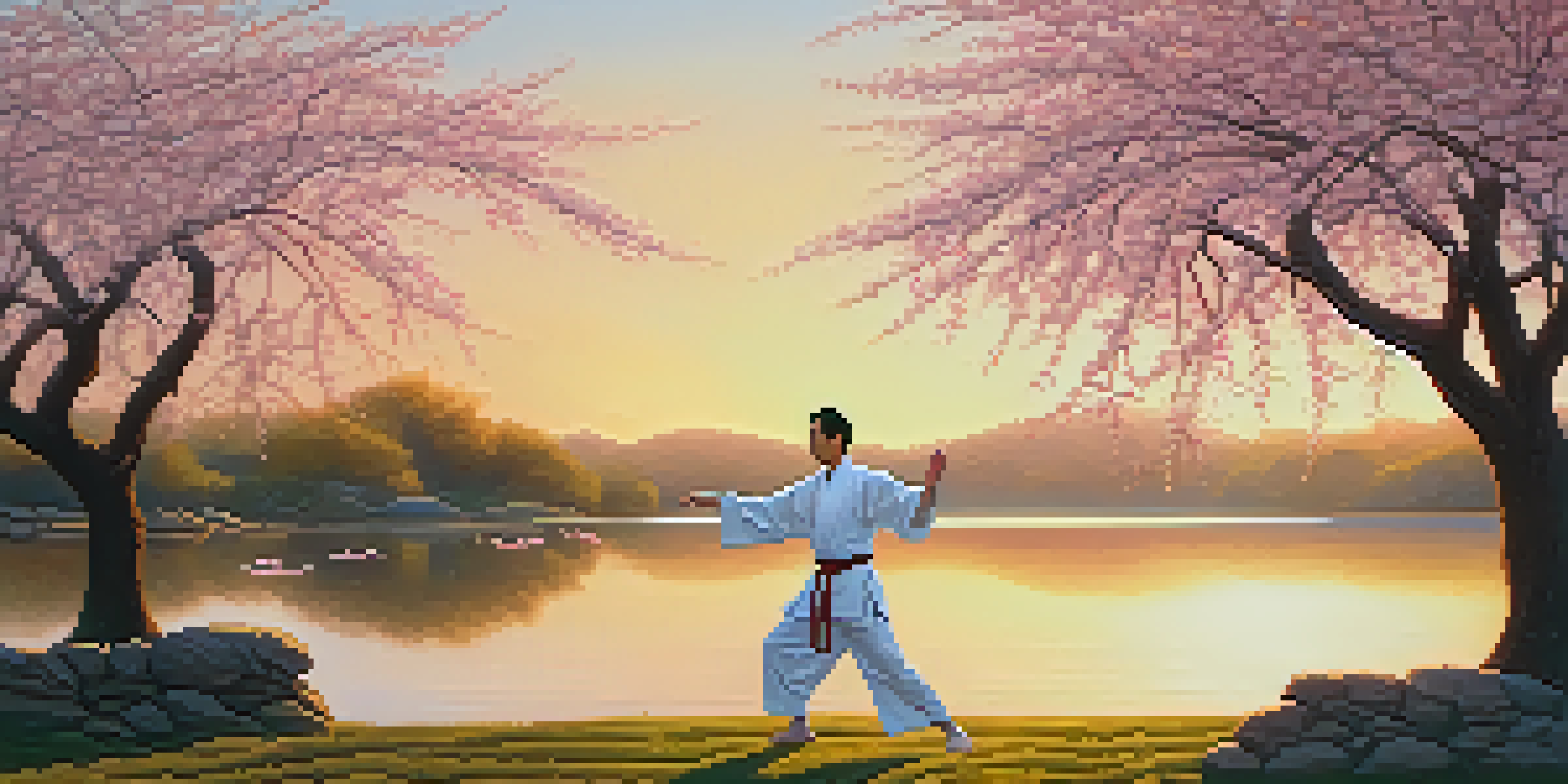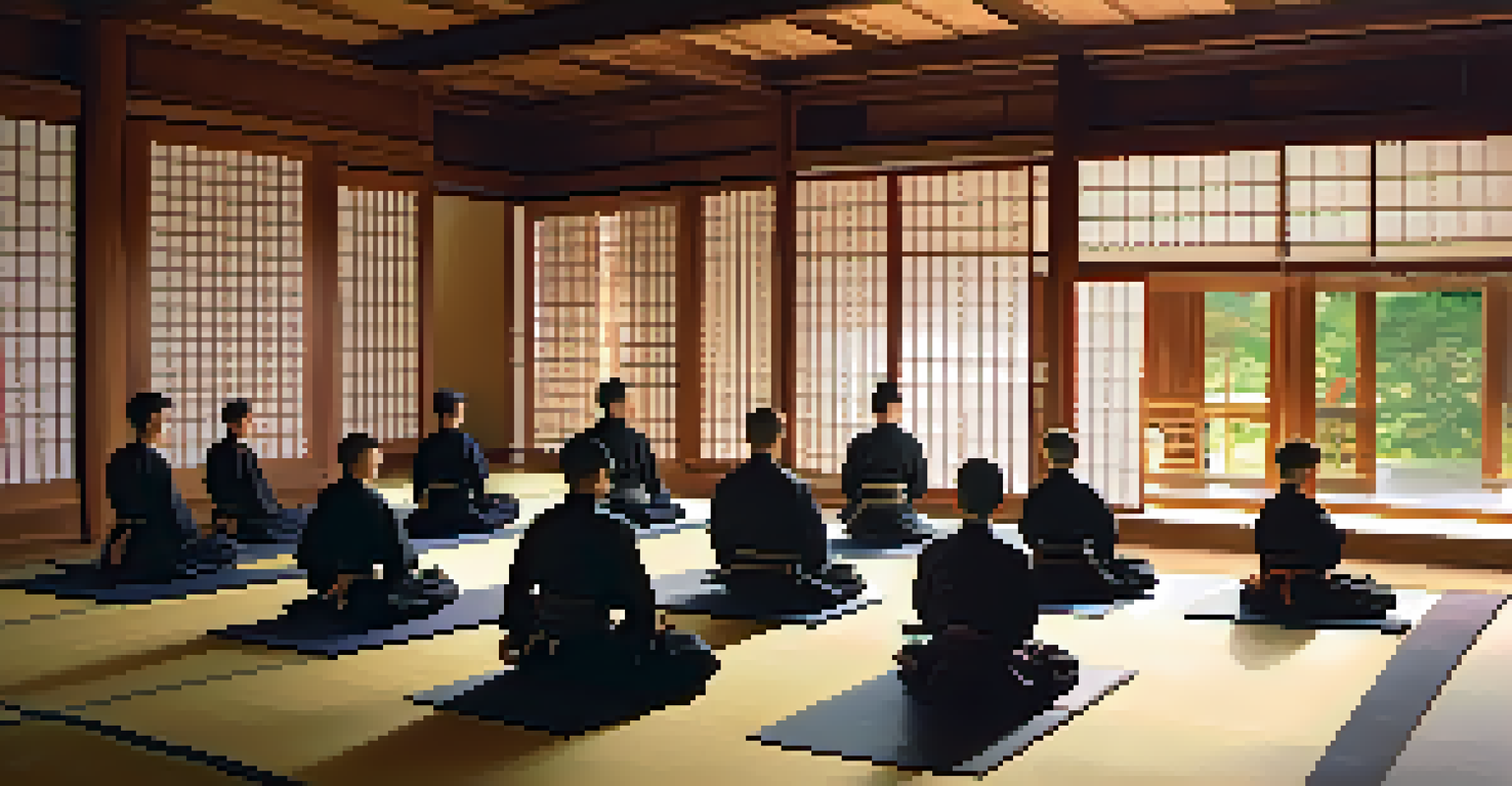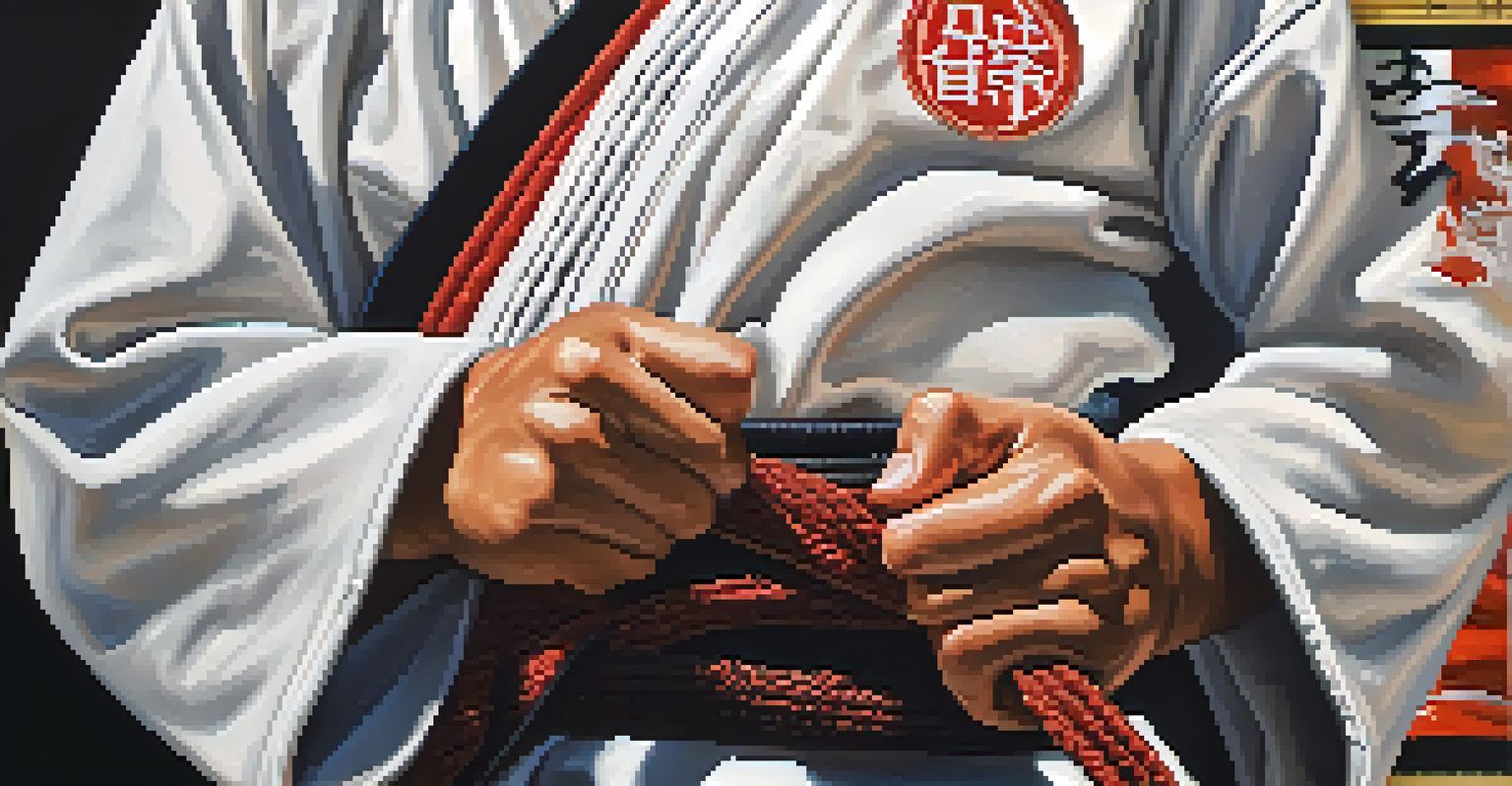The Spiritual Journey in Martial Arts: An Overview of Practices

Understanding the Spiritual Aspect of Martial Arts
Martial arts are often seen as physical disciplines, but they also embody a rich spiritual journey. Practitioners believe that engaging in these arts can lead to inner peace, self-discovery, and a deeper connection to oneself. By focusing on mental clarity and emotional balance, martial arts create a holistic approach that transcends mere combat skills.
The greatest victory is that which requires no battle.
Many martial arts traditions, such as Tai Chi and Aikido, emphasize harmony between mind and body. This harmony allows practitioners to become more attuned to their surroundings and themselves. Through regular practice, individuals often find that they can channel their energies more effectively, leading to personal growth.
The spiritual journey in martial arts is not just about self-defense; it's about understanding the self within the context of a larger universe. This exploration often leads to a sense of purpose and belonging, enriching the practitioners' lives beyond the dojo.
Meditation: A Core Practice in Martial Arts
Meditation is a fundamental component of many martial arts, serving as a bridge between physical training and spiritual growth. It allows practitioners to quiet their minds and cultivate a heightened sense of awareness. This practice is essential for developing focus, which is critical both in martial arts and in everyday life.

For example, in disciplines like Karate and Kung Fu, meditation helps students to visualize their movements and improve their techniques. By spending time in meditation, they learn to control their breath and emotions, which ultimately enhances their performance. Such mindfulness practices can also reduce stress and anxiety, contributing to overall well-being.
Martial Arts Foster Self-Discovery
Through rigorous training, practitioners confront their fears and unlock their true potential.
Incorporating meditation into training routines can lead to profound insights about oneself. As practitioners delve deeper into their thoughts and feelings, they often discover hidden strengths and areas for improvement, fostering a journey towards personal enlightenment.
The Role of Discipline in Spiritual Development
Discipline is a cornerstone of martial arts training, and it plays a pivotal role in the spiritual journey. By adhering to a rigorous training schedule, practitioners cultivate self-control and perseverance. This discipline not only enhances physical skills but also translates into other areas of life, reinforcing the connection between martial arts and personal growth.
Martial arts are a vehicle for developing your human potential.
As students progress through various ranks, they learn the importance of patience and commitment. Each belt earned represents not just a physical achievement but a spiritual milestone as well. This journey underscores the idea that mastery requires time, effort, and a willingness to embrace challenges along the way.
Consequently, the discipline learned through martial arts can foster resilience in the face of life's difficulties. Practitioners often find that the lessons learned on the mat help them navigate their personal and professional lives with greater confidence and clarity.
The Importance of Respect and Humility
Respect and humility are integral values taught in martial arts, shaping the spiritual journey of practitioners. These values encourage individuals to honor their instructors, peers, and the traditions of the art. This sense of respect fosters a supportive community where everyone learns from one another.
In addition to respecting others, martial arts instills a sense of humility. Practitioners learn that no matter how skilled they become, there is always room for improvement and new lessons to be learned. This humble mindset allows for continuous growth, both as martial artists and as individuals.
Meditation Enhances Focus and Calm
Incorporating meditation into martial arts practice cultivates mindfulness and reduces stress.
By embracing respect and humility, practitioners create meaningful connections with their fellow students. This camaraderie not only enhances the training experience but also contributes to a deeper understanding of one's place in the world.
Finding Inner Peace Through Martial Arts
One of the most profound benefits of martial arts practice is the ability to find inner peace. The combination of physical movement, breath control, and mindfulness creates a unique environment for self-reflection. As practitioners engage in their training, they often experience moments of clarity that lead to a sense of calm and balance.
For many, martial arts serve as a sanctuary from the chaos of daily life. The focus required during training allows individuals to temporarily set aside their worries and immerse themselves in the present moment. This practice of being 'in the zone' can be meditative and restorative.
Ultimately, finding inner peace through martial arts can have a ripple effect in a practitioner's life. As they cultivate tranquility on the mat, they may notice improvements in their relationships, work performance, and overall mental health.
The Connection Between Mind, Body, and Spirit
Martial arts beautifully illustrate the interconnectedness of mind, body, and spirit. This triad is essential for achieving balance and harmony, enabling practitioners to become well-rounded individuals. By focusing on each aspect, martial artists can cultivate a deeper understanding of themselves and their capabilities.
Physical training strengthens the body, while mental exercises sharpen the mind. Together, these elements promote spiritual growth, allowing individuals to explore their beliefs, values, and purpose. In this way, martial arts provide a comprehensive framework for personal development.
Discipline Cultivates Personal Growth
The discipline learned in martial arts strengthens self-control and resilience in everyday life.
As practitioners advance in their journey, they often find that their understanding of this connection deepens. The more they train, the more they realize how vital it is to nurture all three aspects, leading to a fulfilling and enriched life.
The Journey of Self-Discovery in Martial Arts
The spiritual journey in martial arts is, at its core, a journey of self-discovery. Through rigorous training, individuals confront their limitations and fears, pushing past them to unlock their true potential. This process often leads to profound insights about one's identity and purpose.
Many practitioners share stories of how martial arts have transformed their lives. They often cite increased confidence, better emotional regulation, and a heightened sense of self-worth. These changes stem from the continuous self-reflection that martial arts encourage.

Ultimately, the journey of self-discovery in martial arts is unique to each individual. While the path may be challenging, the rewards—both spiritual and personal—make it a worthwhile endeavor that can last a lifetime.